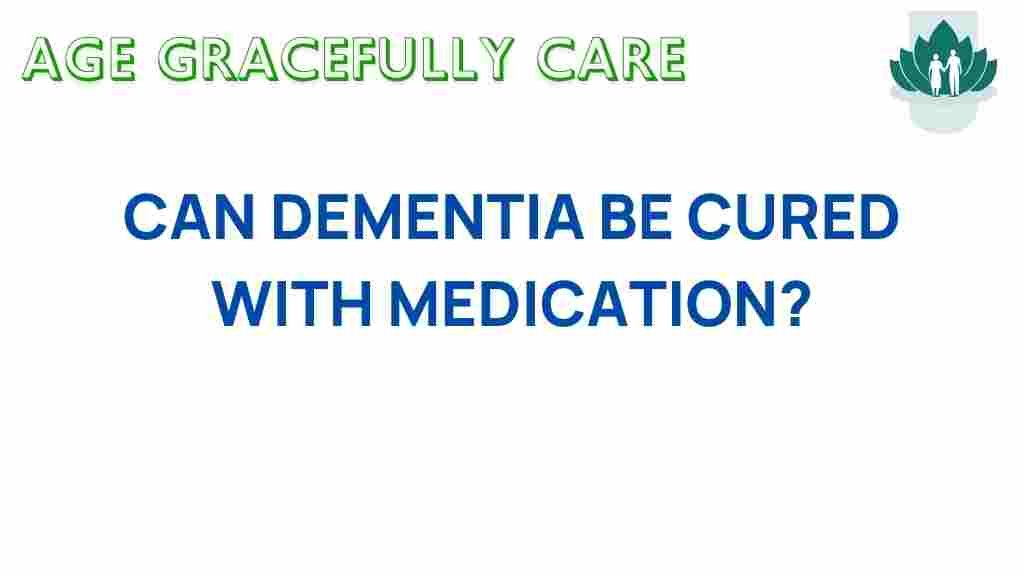Can Medication Truly Reverse the Effects of Dementia?
Dementia is a term that encompasses a variety of symptoms associated with cognitive decline, impacting daily functioning and overall brain health. As the world grapples with an aging population, the prevalence of neurodegenerative diseases, particularly Alzheimer’s disease, has risen significantly. This has led to increased interest in effective medications and treatments that promise to slow or even reverse the effects of dementia. In this article, we will explore whether medication can truly reverse the effects of dementia, the current landscape of treatment options, clinical trials, and what the future holds for brain health and mental health.
Understanding Dementia and Its Impact
Dementia is not a single disease but rather a collection of symptoms that affect memory, thinking, and social abilities severely enough to interfere with daily life. The most common type is Alzheimer’s disease, accounting for 60-80% of dementia cases. Understanding the complexities of dementia is crucial for grasping how medications might work.
- Symptoms of Dementia: Memory loss, difficulty concentrating, confusion, and impaired communication.
- Impact on Daily Life: As cognitive decline progresses, individuals may struggle with basic tasks, leading to a loss of independence.
- Emotional Toll: Dementia can lead to significant emotional distress for both patients and caregivers.
The Role of Medication in Treating Dementia
When it comes to treating dementia, medications are often the first line of defense. While no medication can currently cure dementia, some have been shown to improve symptoms or slow progression. Here’s a closer look at the types of medications available:
- Cholinesterase Inhibitors: These medications, including donepezil, rivastigmine, and galantamine, work by increasing levels of acetylcholine, a neurotransmitter associated with memory and learning. They are primarily used for Alzheimer’s disease.
- NMDA Receptor Antagonists: Memantine is another medication that helps regulate glutamate, another neurotransmitter that can be toxic in high amounts. It is often prescribed for moderate to severe Alzheimer’s disease.
- Antidepressants: People with dementia may experience depression and anxiety. Antidepressants can help alleviate these symptoms, improving overall mental health.
Current Research and Clinical Trials
Research into dementia treatments is ongoing, with many clinical trials exploring new medications and therapies. Here are some noteworthy developments:
- Biologics and Immunotherapy: Researchers are investigating the use of biologics that target amyloid plaques and tau tangles, which are hallmarks of Alzheimer’s disease.
- Neuroprotective Agents: These aim to protect brain cells from damage and may help slow cognitive decline.
- Combination Therapies: Some trials are looking at the effectiveness of combining existing medications with new treatments to enhance outcomes.
For the latest updates on clinical trials, you can visit ClinicalTrials.gov.
Can Medication Reverse Dementia?
The question remains: can medication truly reverse the effects of dementia? Currently, the consensus in the medical community is that while medications can manage symptoms and slow progression, they do not reverse the underlying disease process. Here’s why:
- Complexity of Neurodegenerative Diseases: Dementia is caused by a range of factors, including genetic, environmental, and lifestyle influences. Medications often target specific pathways but cannot address all factors.
- Progressive Nature: Dementia is progressive, meaning it deteriorates over time. Medications may help maintain cognitive function for longer but do not stop the decline.
- Individual Variability: Response to medication can vary widely among individuals, with some experiencing significant benefits while others see little improvement.
Step-by-Step Process for Managing Dementia
Managing dementia involves a comprehensive approach that includes medication, lifestyle changes, and supportive services. Here’s a step-by-step guide:
- Consult a Healthcare Professional: If you or a loved one is experiencing signs of cognitive decline, seek evaluation from a healthcare provider.
- Obtain a Diagnosis: A thorough assessment, including cognitive tests and possibly brain imaging, can help determine if dementia is present and, if so, what type.
- Discuss Treatment Options: Based on the diagnosis, discuss potential medications and treatment plans with your doctor.
- Implement Lifestyle Changes: Incorporate brain-healthy habits, such as regular exercise, a balanced diet, social engagement, and mental stimulation.
- Monitor Progress: Regular follow-ups with healthcare providers can help track symptoms and adjust treatments as necessary.
Troubleshooting Tips for Caregivers and Patients
For caregivers and patients managing dementia, it is essential to have strategies in place for challenges that may arise:
- Communication Techniques: Use simple language, speak slowly, and maintain eye contact to enhance understanding.
- Behavioral Strategies: Establish a consistent routine to reduce confusion and anxiety.
- Emotional Support: Encourage participation in social activities to combat feelings of isolation.
- Safety Measures: Consider modifications to the home to prevent accidents and ensure safety.
Future Directions in Dementia Treatment
The landscape of dementia treatment is evolving rapidly. With advances in research and technology, the future may hold more effective treatments:
- Personalized Medicine: Tailoring treatments based on individual genetic profiles could improve efficacy.
- Gene Therapy: Exploring gene-editing technologies to address the root causes of neurodegenerative diseases may offer hope.
- Digital Health Solutions: Apps and wearables could assist in monitoring cognitive health and encouraging engagement.
Conclusion
In conclusion, while medications for dementia, particularly Alzheimer’s disease, can help manage symptoms and slow cognitive decline, they do not currently reverse the effects of the disease. Ongoing research and clinical trials offer hope for future advancements in treatment. A comprehensive approach that includes medication, lifestyle changes, and emotional support is essential for maintaining brain health and mental health in individuals facing dementia.
As we continue to learn more about neurodegenerative diseases, the importance of early diagnosis and intervention cannot be overstated. If you or a loved one is experiencing cognitive decline, it is crucial to seek professional help and explore available treatment options.
For more information on mental health and cognitive decline, visit Mental Health Resources.
This article is in the category Health and created by AgeGracefullyCare Team
